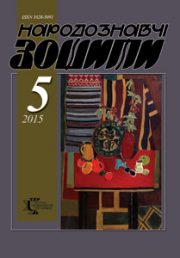The identity of the Polish-Ukrainian borderland
Roman Chmelyk, Lech Mróz
The identity of the Polish-Ukrainian borderland in the context of the European aspirations
The outcome of the negotiations between the Ukrainian authorities and the European Union, meanders of President Janukovych’s policies and actions, the Ukrainian society torn apart between its European and proRussian aspirations are another good illustration of the situation well familiar not only to close observers of political processes in this part of Europe. Already the Orange revolution, as a result of which Viktor Yushchenko came to power in 2005, demonstrated the lack of social and national unity in Ukraine. This lack of unity is much deeper than in any other state in this part of Europe. As we know, Viktor Yanukovych’s attempt to come to power was accompanied not only by electoral fraud, but also by an attempt to poison Viktor Yushchenko in order to eliminate him – not just in the political sense – from the presidential race.




